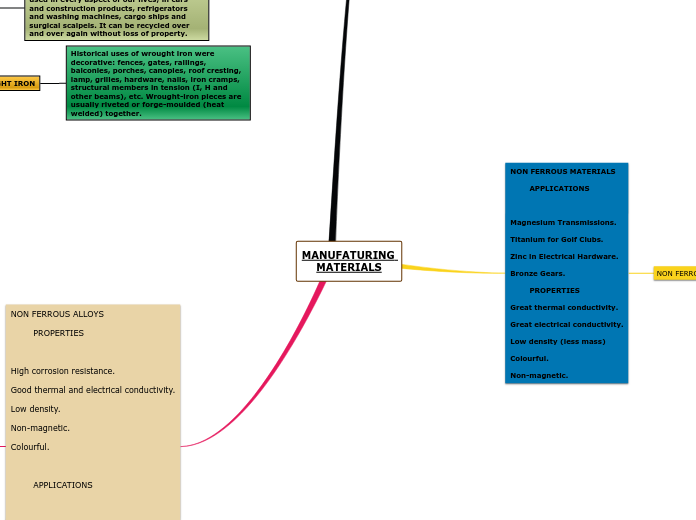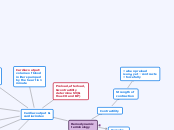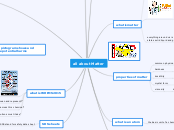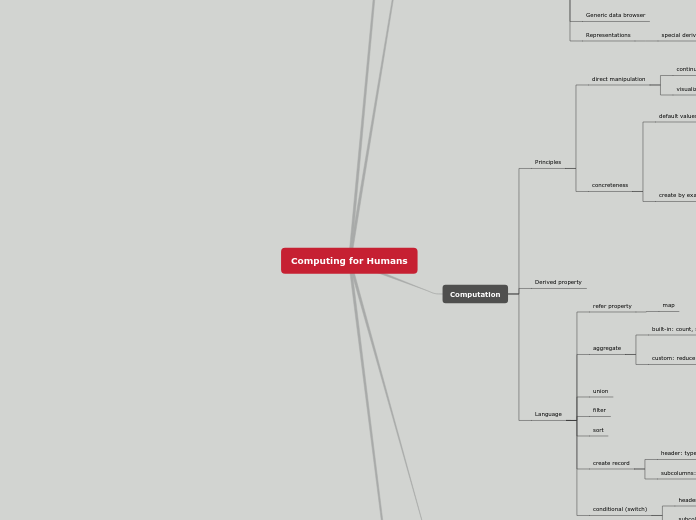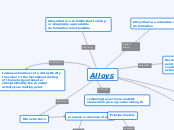MANUFATURING MATERIALS
NON FERROUS ALLOYS
PROPERTIES
High corrosion resistance.
Good thermal and electrical conductivity.
Low density.
Non-magnetic.
Colourful.
APPLICATIONS
Magnesium Transmissions.
Titanium for Golf Clubs.
Zinc in Electrical Hardware.
Bronze Gears.
NON FERROUS ALLOYS
APPLICATION
Gears.
Bearings.
Valves.
Braces.
Brackets
SOLDER
APPLICATION
electronics.
heating.
air conditioning.
mechanical.
fire sprinkler,
PROPERTIES
tensile,
creep,
shear strengths
PLATINUM
APPLICATIONS
silicones,
high-octane gas,
and petrochemical feedstocks,
PROPERTIES
heavy.
soft.
malleable.
BRONZE
APPLICATIONS
construction of sculptures,
musical instruments
medals
PROPERTIES
Melting point of 950 degrees Celsius.
High resistance to corrosion from saltwater.
Exhibits low metal-to-metal friction.
FERROUS METAL
PROPERTIES OF FERROUS METAL
Durable.
Great tensile strength.
Usually magnetic.
Low resistance to corrosion.
A silver-like color.
TYPES
Cast Iron.
Wrought Iron.
Aluminum.
Copper.
Steel.
USEAGE
WROUGHT IRON
Historical uses of wrought iron were decorative: fences, gates, railings, balconies, porches, canopies, roof cresting, lamp, grilles, hardware, nails, iron cramps, structural members in tension (I, H and other beams), etc. Wrought-iron pieces are usually riveted or forge-moulded (heat welded) together.
STEEL
Steel is the world's most important engineering and construction material. It is used in every aspect of our lives; in cars and construction products, refrigerators and washing machines, cargo ships and surgical scalpels. It can be recycled over and over again without loss of property.
CAST IRON
With its relatively low melting point, good fluidity, castability, excellent machinability, resistance to deformation and wear resistance, cast irons have become an engineering material with a wide range of applications and are used in pipes, machines and automotive industry parts, such as cylinder heads, cylinder
NON FERROUS MATERIALS
APPLICATIONS
Magnesium Transmissions.
Titanium for Golf Clubs.
Zinc in Electrical Hardware.
Bronze Gears.
PROPERTIES
Great thermal conductivity.
Great electrical conductivity.
Low density (less mass)
Colourful.
Non-magnetic.
NON FERROUS
BRASS
APPLICATIONS
Locks.
Gears.
Bearings.
Valves.
Braces.
PROPERTIES
Tarnish-resistant.
Low-friction.
Malleable.
Easily machined
SILVER
APPLICATION
Solar technology.
electronics.
soldering and brazing.
engine bearings.
medicine.
PROPERTIES
nearly white.
lustrous.
soft.
very ductile.
malleable.
nickel
APPLICATIONS
Batteries
Coatings
Alloying element
properties
Nickel is silvery-white, hard, malleable, and ductile metal.
It is a good conductor of heat and electricity.
It is bivalent, that is it has a valency of two.
The metal dissolves slowly in dilute acids.
LEAD
APPLICATIONS
Lead Acid Battery.
Rolled Extrusions.
Lead Pipes.
Pigments.
PROPERTIES
Conductivity : Poor transmission of heat or electricity.
Softness : Relatively Soft.
Tensile : It can be stretched without breaking.
Luster : A shine or glow.
Aluminium
APPLICATIONS
Consumer electronics.
Household and industrial appliances.
Aircraft components.
Spacecraft components.
Ships.
PROPERTIES
Conductivity
Corrosion
Density
Copper
PROPERTIESE:
xcellent heat conductivity.
Excellent electrical conductivity.
Good corrosion resistance.
Good biofouling resistance.
Good machinability.
APPLICATIONS
High conductivity wires.
Electrodes.
Heat exchangers.
Cooking utensils.
